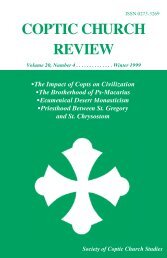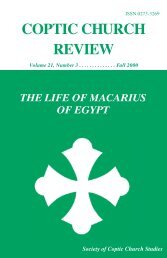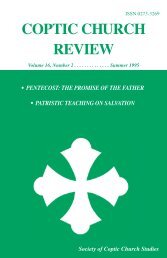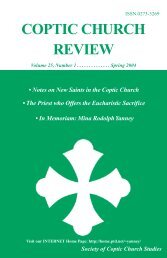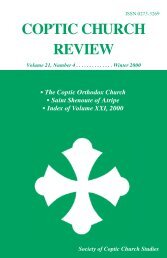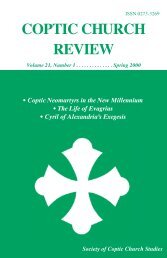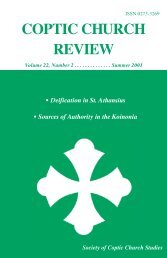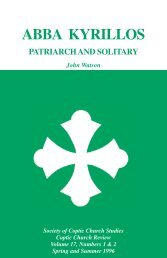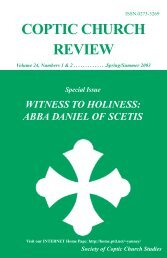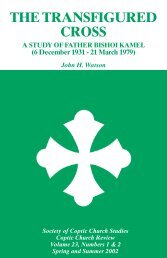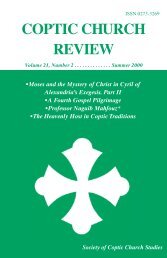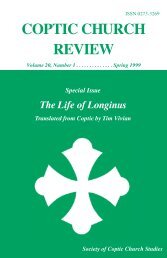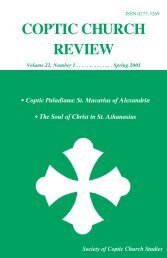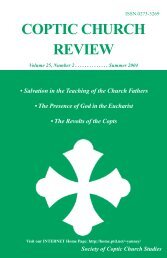2004 Fall.Vol25.#3.pdf - Coptic Church Review
2004 Fall.Vol25.#3.pdf - Coptic Church Review
2004 Fall.Vol25.#3.pdf - Coptic Church Review
You also want an ePaper? Increase the reach of your titles
YUMPU automatically turns print PDFs into web optimized ePapers that Google loves.
88 <strong>Fall</strong> <strong>2004</strong> • <strong>Coptic</strong> <strong>Church</strong> <strong>Review</strong> - Volume 25, Number 3<br />
doctrine: “He does not meet the difficulty that what our Lord had said He was giving<br />
was not his Spirit but his Body. The Last Supper is not Pentecost.” Zwingle,<br />
one of the Reformation leaders, denied even that spiritual presence of Christ, saying<br />
that in the Eucharist there is but plain bread and wine, a reminder of the salvation<br />
achieved long ago on Calvary. Gregory Dix summarizes the Eucharistic teaching<br />
of Zwingle: “The Eucharistic action consists in a vivid mental remembering of<br />
the passion as the achievement of ‘my’ redemption in the past.” 27<br />
When and by Whom Does the Eucharistic Change Happen?<br />
Beside the confusion in the West concerning the change in the elements of the<br />
Eucharistic oblation, another question has been raised: When does the change<br />
occur? A third question is related: Is the change the work of the Son or the Holy<br />
Spirit? In the sixth century, the Roman Catholic <strong>Church</strong> removed the Prayer of the<br />
Descent of the Holy Spirit, the Epiclesis, from her Liturgy; which had been in the<br />
Roman Liturgy from the earliest centuries. This issue may look irrelevant now<br />
since the Roman Catholic <strong>Church</strong> has re-inserted the Epiclesis, the prayer for the<br />
descent of the Holy Spirit on the elements, a tradition that had been interrupted for<br />
more than thirteen centuries. Yet two reasons make such study essential:<br />
(1) The need to know the present teaching of the Roman Catholic <strong>Church</strong>. This is<br />
still ignored at the parish level and in many Orthodox Sunday school curricula.<br />
(2) The second reason is more important because it is related to the Orthodox<br />
faith itself and how far Orthodox churches are following <strong>Church</strong> Tradition.<br />
Contrary to what happened with the doctrine of transubstantiation, in which<br />
Orthodox teachers everywhere followed the Roman Catholics, here they preferred<br />
not to follow them and kept the Epiclesis. Although they kept the<br />
ancient liturgical formula, yet they thought in the same scholastic mind as the<br />
Roman Catholics, but in an opposite direction. While the Roman Catholics<br />
spoke of ‘the Institution Narrative’ (the words of Christ) as the moment of<br />
consecration, that moment for the Orthodox became the Epiclesis. Evelyn<br />
Underhill describes the belief of the early <strong>Church</strong>: “For the early <strong>Church</strong>, the<br />
whole of this great prayer (the Eucharistic Liturgy) was a single act of worship<br />
. . . . There was no attempt to identify the consecration with any one formula<br />
or moment; whether the recital of the Words of Institution or the Epiclesis.” 28<br />
As early as the eighth century St. John of Damascus writes in the East:<br />
27 For more details of the history of the Eucharistic controversy among Protestants see G. Dix, The<br />
Shape of the Liturgy 629- 636, op. cit., and Philip Schaff: History of the Christian <strong>Church</strong>, vol. 7,<br />
1910 (reprinted by Eerdmans, 1978): 612- 682.<br />
28 Worship, op. cit., 136.




